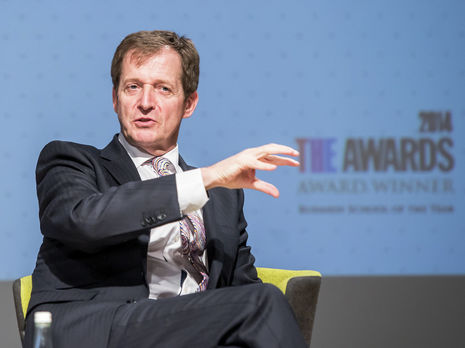Alastair Campbell: “People get confused about what happiness means”
Tilly Palmer talks to Alastair Campbell about dealing with depression and alcoholism, Good Morning Britain and his favourite swear words.

In another life, Alastair Campbell would’ve dreamt of being a footballer. He tells me this on a Wednesday afternoon Zoom call, a few days before he begins a stint on Good Morning Britain. In what can only be described as positive irony, he will replace Piers Morgan, who left in the wake of a record 57,121 complaints to Ofcom, having told viewers he ‘didn’t believe’ Meghan Markle’s interview with Oprah where she spoke at length about her mental health.
Campbell left Downing Street in 2003, after serving in Tony Blair’s government. He’s worked as a journalist, writer, political consultant and strategist, as well as a mental health ambassador. No less impressive are his earlier dalliances as a roulette dealer and bagpipe busker.
Throughout our conversation, we talk about football, the Labour Party, Twitter. It seems recurring themes in Campbell’s life are opposing viewpoints and inherent conflict. Yet in another turn of positive irony, mental health is the one topic that seems to defy polarity. Alastair Campbell has spoken out about mental health throughout his career. I ask him if he ever regrets this, if people have treated him differently. He tells me he would’ve probably rejected my email if I’d asked to talk about his life in politics “but mental health, I actually like talking about it. I like campaigning on it. I think I can make a difference. That being said, I can see why a lot of people don’t like talking about it. But I’ve never felt ashamed. I actually feel quite proud.” He proceeds to describe how his daughter has suffered with anxiety, his son with alcoholism. “Most families have got these kinds of issues, and I just think we’re better off if we’re out there about it.”
Campbell studied Modern Languages at Gonville and Caius. He’s often said that he didn’t particularly enjoy his time there: “I ended up getting into two different social sets that both revolved essentially around drinking a lot, and I also spent a lot of the time, if I was going out to pubs, deliberately seeking out pubs that weren’t full of students. So I was kind of rebelling in a very uncoordinated sort of way.”
“I can see why a lot of people don’t like talking about it. But I’ve never felt ashamed. I actually feel quite proud”
Mental health support in Cambridge around the 1970s seems to have been virtually non-existent. Although he tells me that there was support for his friends who had conditions like Bipolar disorder, drinking was “seen more as a kind of discipline and management issue as opposed to thinking that there might be a mental health thing going on. So I never really asked for mental health support. Insofar as I remember any contact with the authorities, if I’d really misbehaved; if somebody complained about my behaviour, then I would go and see someone.” One of the problems with the stigma around mental health for years has been that unless an issue was obvious at surface level, it didn’t exist. Campbell describes seeing his brother, who had schizophrenia, in hospital as “a life changing moment...I didn’t know anything about it and so I saw that as mental illness, so I don’t think I ever really thought about anything that I had as a mental health problem.”
He remarks that he has a bad memory, so it’s no surprise that he published eight volumes of diaries. But it is the act of reflection that Campbell feels is important: “This may be an atheist way of broadly trying to stay on the straight and narrow, but I think people get confused about what happiness means. I don’t see happiness as having a good time. I love seeing my football team win, but that to me, is just a great moment. The happiness comes from the connections that are attached to that, and for me comes from the fact that I’ve actually had quite a sense of happiness and wellbeing and fulfilment in the last year.” This came a few nights ago as he watched television with wife Fiona Millar and reflected on being together for 42 years.
“I don’t think you really know if you’ve had a happy life until you start to look back a bit. With the way this lockdown is, there’s a focus on how people can’t wait to have a beer, can’t wait to get on holiday. The deeper experience might actually be that in a few years we look back and think, ‘I learnt a lot that year, I was really proud of myself for getting through that the way I did.’”
“This is why people like Trump and Johnson are maybe so effective in the modern world; it’s almost like people do, in a sense, see it as an extension of entertainment”
Over lockdown, Campbell laughingly tells me he translated his book Living Better into German. “I think that’s me saying to myself ‘you didn’t really work hard at university.’” This kind of internal pressure, situated in an externally pressurising environment is a concept that no Cambridge student is unfamiliar with. For Campbell, “it has given me resilience: having dealt with a breakdown, having dealt with psychosis, having dealt with depression. I think that every time I get through a depression or a depressive episode, I feel quite strong. I think a lot of my energy and my creativity comes when I’m at the other end of the scale, when I’ve got too much energy. A lot of the best work I’ve ever done has been when I’ve been coming out of a depression.”
This boundless energy is incredibly invigorating in conversation, and Campbell is not narcissistic; he is inquisitive about the current university experience, he likes talking to people from different generations (another reason, he tells me, why he agreed to my interview). All these things make him the obvious candidate for Good Morning Britain as a mental health advocate who listens as well as shares, something that Piers Morgan undoubtedly lacked. I ask him what his aims are for his time on the show; he references Paul Gascoigne’s recent interview and tells me they have sent him a list of words he isn’t allowed to say. Contrary to popular Malcom-Tucker belief, I expected him to swear much more. I tell him this, and he responds with a sigh: “I swear way too much”. What is Alastair Campbell’s favourite swear word? “I think the F-word is the one I use the most”; and after some deliberation, he adds, “I quite like cock-womble” (Apparently also featured on the list).
It doesn’t seem a far leap from politics to entertainment. “We’ve now got an old Etonian Bullingdon boy, who looks like his party’s going to take Hartlepool from the Labour party. Something pretty strange is going on.” Why does he think this is? “The labour party has ceased to be for a lot of people: the vehicle that says they’re the people that can get the sort of country I want, so most things for me will have some sort of political resonance.” He goes on to use the quote ‘Politics is showbiz for ugly people’, explaining “This is why people like Trump and Johnson are maybe so effective in the modern world; it’s almost like people do, in a sense, see it as an extension of entertainment.” He feels that people think “‘I don’t care if he’s telling the truth, he does make me laugh.’ I think something’s changed that we don’t really understand.”
I ask him what he thinks is positive despite these conditions: “If your generation doesn’t start to do the stuff that’s going to get things on a better keel, well we’ve had it. We can’t go on like this, I don’t think. People go on about millennials, they’re all spoiled, they’re all entitled, but actually I’ve been really impressed how most people have coped with what has been a pretty horrific set of circumstances. There’s amazing niceness out there still, there’s a lot of creativity still out there. Whatever happens, I still think we’ll produce great artists and writers and musicians. So I find the political scene very depressing, not just that Johnson’s Prime Minister but that he could be again. But I still think that when I’m out and about, I think yeah, it’s a pretty good world, pretty good place.”
We’ve overrun by half an hour by this point, and Campbell has to leave. But if there’s one takeaway from our conversation, it’s that Campbell represents a rare feeling of support from spheres where you don’t often find it - political, generational, professional - and that Campbell believes there is resilience which is inherent in individuals and in younger generations that can overcome self-facilitated and external opposition.
 News / SU reluctantly registers controversial women’s soc18 December 2025
News / SU reluctantly registers controversial women’s soc18 December 2025 News / CUP announces funding scheme for under-represented academics19 December 2025
News / CUP announces funding scheme for under-represented academics19 December 2025 Features / Should I stay or should I go? Cambridge students and alumni reflect on how their memories stay with them15 December 2025
Features / Should I stay or should I go? Cambridge students and alumni reflect on how their memories stay with them15 December 2025 Fashion / The art of the formal outfit 18 December 2025
Fashion / The art of the formal outfit 18 December 2025 Lifestyle / Summer lovin’ had me so… lonely?18 December 2025
Lifestyle / Summer lovin’ had me so… lonely?18 December 2025









